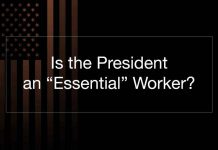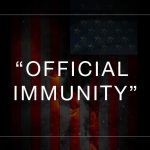Last Updated on October 5, 2021 by Constitutional Militia
The last thing I claim to be is a political-campaign tactician. Yet it seems obvious to me that revitalization of “the Militia of the several States” ought to become a major issue in Representative Paul’s Presidential campaign, for the following reasons:
1. Revitalization of “the Militia of the several States” is required by the Constitution—“[a] well regulated Militia, being necessary to the security of a free State” (U.S. Const. amend. II). To this author’s knowledge, at the present time no State either has a fully constitutional Militia in place or intends to raise such a Militia, notwithstanding all the problems of “homeland security” that confront this Nation.
Self-evidently, a constitutionalist candidate should promote whatever the Constitution requires—particularly when the Constitution describes no establishment or institution other than the Militia as being “necessary” for any purpose. And especially when neither Congress, nor any State, nor any Presidential candidate is doing or saying anything of consequence about this unconscionable and dangerous disjunction between constitutional mandates and political practices.
2. Revitalization of “the Militia of the several States” is necessary to set any program of “homeland security” on a legally proper and practical foundation.
Basing “homeland security” on the Militia will uniquely comport with the Constitution, which explicitly assigns the authority and power “to execute the Laws of the Union, suppress Insurrections and repel Invasions” to the Militia and only to the Militia, and explicitly assigns the duty to “take Care that the Laws be faithfully executed” only to the President of the United States, who it appoints as “Commander in Chief * * * of the Militia of the several States, when called into the actual Service of the United States” (U.S. Const. art. I, § 8, cl. 15; art. II, § 3; and art. II, § 2, cl. 1).
Basing “homeland security” on the Militia will promote federalism in the most thoroughgoing manner possible, because it will organize “the security of a free State” from the bottom up, through mobilization of concerned and knowledgeable citizens within each of the States, not from the top down, through a central bureaucracy staffed with supposed “professional security experts” within the General Government.
Basing “homeland security” on the Militia will remove any further excuse for the on-going para-militarization of State and Local police forces, ultimately subject to directives from the General Government’s Department of Homeland Security. This will thwart the creation, whether intentional or accidental, of a National police state in this country.
Basing “homeland security” on the Militia will mobilize tens of millions of Americans for various types of service—far in excess of any police or emergency-response forces that could possibly be raised otherwise, let alone funded.
Basing “homeland security” on the Militia will prepare this country for any conceivable crisis, because it will bring to bear on the question the minds of millions of citizens best situated, most knowledgeable, most experienced, and most highly motivated to foresee future problems in their own States and Localities, and to devise workable solutions for those problems that take maximum advantage of the personnel and resources locally available.
Thus, making revitalization of the Militia a major campaign issue would demonstrate to the electorate Representative Paul’s successful “homeland security.” Indeed, it would demonstrate that he is stronger and more cogent on “national security” than any other candidate, because he would be the only one with a plan that was at once constitutional, comprehensive, practical, and proofed against a National police state.
3. Revitalization of “the Militia of the several States” will restore popular self-government in this country.
At the present time, little scope exists for intensive self-government in America, other than during elections and on those odd occasions when large numbers of citizens may be moved to petition their representatives with respect to some controversial pending legislation or other governmental action. In contrast, when revitalized the Militia will be permanent institutions, in continuous activity, directing the attentions of the vast majority of citizens every day towards all the needs of “homeland security” in their Localities, their States, and the Nation as a whole. The Militia will provide citizens, not only with a context in which critical political debate and action could take place, but also with a personal and collective sense of need, of mission, of cohesion, and of competence. Moreover, through the Militia, a large measure of initiative, authority, and responsibility will pass from public officials to the people, to be exercised by them directly. The people will be able to solve problems themselves, rather than wait for others to solve them (and generally be disappointed by the results); and to act immediately, often in advance of danger, not when it is too late. Thus, as members of the Militia, citizens will become active, self-directed participants in self-government, rather than remaining mere spectators who can do little more than respond to the initiatives or (more likely) failures of others.
The bedrock of Representative Paul’s campaign—as of his entire career in politics—is his concern for popular, constitutional self-government. Making revitalization of the Militia a major issue would demonstrate how this political philosophy can be translated into actions that truly promote
“the common defence” and “the general Welfare” (U.S. Const. preamble).
4. Revitalization of “the Militia of the several States” will provide a means for the American people themselves to effect many critical reforms in addition to the restructuring of “homeland security” against “terrorists.”
The likelihood of a collapse of America’s monetary and banking systems in the not-too-distant future hangs over this country as a sword of Damocles. Although major reforms of those systems are absolutely essential, for Congress or the Judiciary to undertake any significant actions in that direction unless and until a financial catastrophe erupts is improbable to the point of impossibility. Representative Paul is the only major political figure speaking out on the issue. But it is not enough even for him simply to advocate “repeal” of the Federal Reserve System without explaining exactly how—gradually and systematically, according to a detailed plan—this country’s monetary and banking arrangements could be restructured without plunging the markets into extreme turbulence, and the country into social and political crises.
A controlled reform, however, could be effected through “the Militia of the several States.” As part of a plan for providing economic “homeland security,” the Militia could require their members gradually and methodically to acquire adequate amounts of silver and gold coin, to maintain accounts in “electronic” silver and gold (such as through or an equivalent service), and to conduct their common business transactions in silver and gold as well as in, or even in preference to or to the exclusion of, Federal Reserve Notes. Because the Militia would consist of the vast majority of the general public, these steps would quickly create a parallel currency system of silver and gold coinage, actually employed in day-to-day transactions as media of exchange, that could circumvent, supplement, compete with, and if necessary in (or even before) an economic calamity altogether replace the Federal Reserve’s fiat currency and the Treasury’s base-metallic coinage—whether in just a few States or throughout the Nation as a whole. Moreover, in his constitutional capacity as “Commander in Chief * * * of the Militia of the several States,” President Ron Paul could encourage, facilitate, or even direct this process without having to wait for a politically reluctant or incompetent Congress to act—and without having to defer to the Federal Reserve’s “monetary policy”, because the use of silver and gold by common Americans within the Militia is neither a part of, nor subject to, that “policy.”
Thus, by incorporating revitalization of “the Militia of the several States” into his campaign, Representative Paul could present to the voters a very concrete, comprehensive, and credible method for dealing decisively with the dangers the Federal Reserve System poses.
A problem that Representative Paul, as a constitutional “strict constructionist,” will be forced to face throughout his campaign will be the attempt on the part of other candidates and the big media to malign him as “insensitive” to the needs of the poor and disadvantaged, because he refuses on principle to endorse proposals to alleviate poverty and other economic ills by means of “top-down” bureaucratic schemes for redistribution of wealth. Here, too, supporting revitalization of the Militia could materially assist his candidacy.
One critical function of “homeland security” assigned to the revitalized Militia will be to maintain economic and social stability in their States and Localities. “The economy” and “society” are not bloodless abstractions, however. First and foremost, maintaining economic and social stability entails maintaining the economic and social stability and well-being of particular individuals, families, local businesses, educational and charitable institutions, and so on.
Because every able-bodied adult citizen will serve in some capacity in the Militia, everyone through the force of circumstances will learn to work with everyone else, and through relationships of mutual reliance and responsibility will come to be concerned with everyone else’s welfare. Participation in the Militia will teach Americans—from all social and economic classes, and all walks of life—
that their legitimate interests are often identical, and even more often interdependent; that people should gain from the community in proportion to what they contribute to it; that the selfish outlooks of special-interest groups and factions are counterproductive, socially destabilizing, and unpatriotic; and that unity in a community depends upon instilling in each member a recognition of his personal duty to every to other member, and through that recognition creating a spirit of mutual purpose, cooperation, reliance, and trust.
Thus, the Militia will become, in important part, institutions for promoting true social welfare, primarily on the Local but also on the State level. Militia units will concern themselves with the economic condition of their individual members and their members’ families. They will raise money for those in difficulty, arrange for jobs, and generally act as clearing-houses to match the needs and skills of some members to the resources and opportunities that other members can provide. They will assist legal immigrants to assimilate quickly. And they will even help to socialize troubled youths, by taking them from street gangs and other undesirable milieux (including the menticidal “public schools”) into the discipline of Militia training where responsible members of the community will mentor them in patriotism, constitutionalism, and general civilized behavior. [See Ron Paul and Edwin Vieira in the new DVD “Fiat Empire“]
Moreover, because the Militia will operate in the very Localities where social-welfare work may prove to be needed; will number among their members not only the individuals who may require assistance but also those who can best provide it; and will otherwise have unique knowledge of Local needs, personnel, and resources; they will perform the social-welfare function far more efficiently than distant, aloof, and uncaring governmental agencies and the bureaucrats infesting them.
Applying federalism, subsidiarity, self-reliance, and concern for the general welfare of their communities, the Militia will demonstrate a “compassionate constitutionalism” that will exceed in scope and effectiveness anything that could be accomplished either through “liberal” politicians’ bureaucratic “welfare” schemes, or through “conservatives’” “trickle-down economics.” Thus, making revitalization of the Militia a key issue in Representative Paul’s campaign would enable him to turn the tables on all of his detractors.
5. Revitalization of “the Militia of the several States” will cut across the dividing lines on America’s phony “right/center/left” political spectrum, and unite Local communities in mutual efforts directed towards providing the only true “homeland security,” “the security of a free State.”
Tens of millions of Americans instinctively know what “the security of a free State” is—and that they do not now enjoy it. They have been prevented from attaining that security primarily because of: (i) the political oligopoly consisting of the “two” major political parties, professional politicians, special-interest groups, and the big media; and (ii) the “divide-and-rule” tactics that oligopoly has successfully employed in election after election. Americans realize that this is the situation, and resent it—but they do not know what to do to rectify it.
Revitalizing the Militia is the answer. The Militia will disarm the oligopoly and frustrate its tactics. Because their purpose is unitary—providing “the security of a free State”, and nothing less—the Militia will tolerate no parties, special-interest groups, or factions that detract from the unity necessary to achieve that end. And “divide and rule” will have neither place, nor proponents, nor practitioners within the Militia, because (as pointed out above) mutual duty, purpose, cooperation, reliance, and trust will be the rule. For part two click below.




































